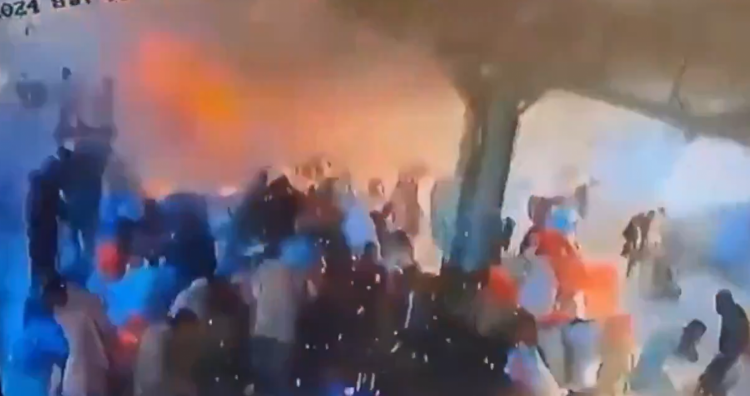A powerful suicide bombing at a train station in Quetta, the capital of Pakistan's Balochistan province, killed at least 25 people on Saturday and injured over 50 others. The attack, claimed by the Balochistan Liberation Army (BLA), occurred around 9 a.m. on a crowded platform as passengers waited to board a train bound for Rawalpindi. Among the dead were soldiers, railway staff, and civilians, as confirmed by local officials.
The explosion caused widespread chaos, with eyewitnesses describing scenes of devastation and panic. "There was a lot of chaos. People were running back and forth, people were lying martyred, some without legs and arms and hands," said Fareed, a witness to the blast. Steel beams and portions of the station's roof were blown apart, and luggage was scattered across the blood-stained platform.
Senior Police Superintendent Muhammad Baloch confirmed the explosion was a suicide bombing. According to Commissioner Hamza Shafqaat, "The explosion happened when a large number of passengers were present on the platform." Security forces quickly cordoned off the area, and an investigation into the attack is underway.
The BLA, a separatist militant group seeking independence from Islamabad, claimed responsibility in a statement, asserting that the target of the suicide bomber was military personnel present at the station. This attack is the latest in a series of high-profile assaults by the group, which often targets security forces, infrastructure, and foreign nationals, particularly Chinese workers involved in Beijing's multibillion-dollar Belt and Road Initiative (BRI) projects in the region.
#Pakistan is suffering the consequences of its deeds. #BombBlast took place in the #QuettaRailwayStation of Pakistan in which hundreds of people lost their lives. Pakistan itself is responsible for this.
क्वेटा रेलवे स्टेशन को बलूच सेना ने उड़ा दिया! #Blast pic.twitter.com/uUgMeQ4jKk — Rocky Bhai (@Iambakshi) November 9, 2024
Prime Minister Shehbaz Sharif condemned the bombing, stating, "Those who orchestrated the attack will pay a very heavy price for it." He emphasized the resolve of Pakistan's security forces to eliminate terrorism from the country. The attack prompted messages of condolences from international bodies, including Afghanistan's Foreign Ministry and the Russian Embassy in Islamabad.
Despite heightened security measures at the station, including a walk-through gate to detect explosives, the attacker managed to bypass these measures, likely disguising himself as a passenger, said Shahhid Nawaz, head of security at Quetta's train station. "It is usually very difficult to stop such suicide attacks," Shafqaat remarked.
In recent months, Balochistan has been a hotspot for militant activity. The resource-rich yet underdeveloped province is home to a longstanding insurgency, with separatist groups accusing the central government of discrimination and exploitation. The BLA has intensified its operations, targeting military personnel and Chinese nationals in particular. Last month, the group claimed responsibility for a suicide attack on a convoy of Chinese citizens outside Karachi airport, killing two.
The insurgency has been further complicated by the involvement of Islamist militant groups operating within the province, creating a complex security landscape. Balochistan's deep-water Gwadar port, a key component of China's BRI, has become a focal point of conflict, as separatist groups demand an end to Chinese-funded projects and the departure of foreign workers.
Saturday's bombing highlights the ongoing challenges faced by Pakistani authorities in curbing militant violence. Security forces and emergency personnel worked tirelessly to transport the injured to local hospitals. Tragically, several critically wounded victims succumbed to their injuries, raising the death toll further.
Superintendent Muhammad Baloch emphasized the resilience of local security forces, stating, "When their people are arrested, they also attack in retaliation. We all have to fight this war. We are resilient. Our teams are here and trying to save as many lives as we can."




